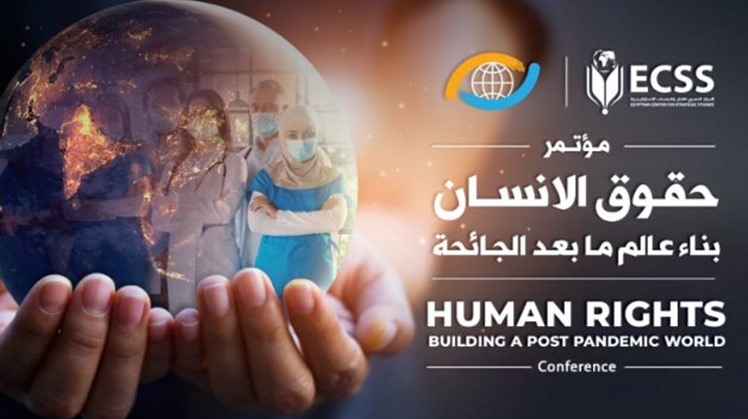Cairo – 6 April 2021: A conference on “Human Rights: Building the Post-Pandemic World” is being organized by the Egyptian Center for Strategic Studies (ECSS) on Thursday, 8 April, to tackle the repercussions of the coronavirus pandemic.
The conference will be attended by high-profile ministers, officials and representatives of UN organizations. Participating in the conference are civil society organizations working in the field of development that will present their successful experiences since the outbreak last year.
The ECSS has adopted the International Agenda on Human Rights as a general framework for the conference to be discussed in the sessions to put forward thought-provoking and practical recommendations on the topic.
Dr. Khaled Okasha, the General Manager of the ECSS, said “the ECSS realizes that the issue of human rights requires collaborative efforts, which is why the conference will see more participants representing the breadth of the community, including representatives from the Egyptian government, the private sector, civil society, volunteering groups, national councils, human rights organizations, and international organizations that will be significantly represented in the conference.”
The conference is scheduled to cover a broad spectrum of topics relating to human rights domestically and abroad.
The conference will be opened by Dr. Okasha, followed by two opening statements by Dr. Hala Al-Said, the Minister of Planning and Economic Development, and Dr. Rania Al-Mashat, the Minister of International Cooperation. Scheduled to take part in the opening session, as well, Dr. Yasser Abdel-Aziz, a member and representative of the National Council for Human Rights.
High-profile participants in the conference include the ministers of health and population, education, social solidarity, chairpersons of the National Council for Women and the National Council for Human Rights, as well as representatives of the World Health Organization (WHO), the International Organization for Migration (IOM), the International Committee of the Red Cross (ICRC), the Save the Children Fund, and a number of civil society institutions.
The first session of the conference, titled “Man is the Goal: Human Rights amid the Pandemic” addresses two key points: first, promoting the right to health given the fundamental weaknesses COVID-19 has laid bare, while underlining the need for prioritizing such right internationally and ensuring the equitable distribution of vaccines, and, second, combating discrimination and racism linked to the pandemic, notably the discriminatory and racial behavior against the most vulnerable groups such as women, refugees, and migrants with a focus on tools and approaches to prevent such biases to build a better post-pandemic world.
Participating in the first session are: Dr. Hala Zayed, the Minister of Health and Population, who will talk about “Where does the right to health stand within the human rights system?”; Dr. Naima Al-Qusayr, the WHO representative in Cairo, will discuss “The pandemic and threats to the right to life"; and Mr. Jerome Fontana, the head of the ICRC Delegation in Cairo, will tackle the critical topic of “Ensuring the equitable distribution of COVID-19 vaccines”.
Other speakers in the first session include Dr. Maya Morsi, President of the National Council for Women, who will respond to the question “Have women suffered additional repercussions due to COVID-19?” Laurent De Boeck, Chief of IOM Mission in Egypt, will cover “The twin sufferings of migrants and refugees”. Dr. Salah Sallam, member of the National Council for Human Rights will address the “New approach to human rights in the post-pandemic world”. Dr. Abdel-Moneim Said, Chairman of the ECSS Advisory Board, will close the session by focusing on “Freedoms and characteristics of a post-coronavirus world”. Moderating the session will be Dr. Mohamed Ibrahim Al-Dweiry, deputy general manager of the ECSS.
The second session will cover “Challenges to Equality and Promoting Sustainable Development Efforts”, addressing the effect of inequality and economic, social, and cultural disparities, particularly in education and digitization, on deepening the negative consequences of COVID-19.
The session will shed light on the importance of sustainable development and its role in creating a better post-pandemic world in which the rights of present and future generations are protected and the environmental dimensions are taken into account.
Dr. Tarek Shawky, the Minister of Education and Technical Education, will open the session by answering the question, “How has COVID-19 affected the right to education?” Dr. Maged Othman, head of the Egyptian Center for Public Opinion Research (Baseera), will discuss the shift toward digitization; Essam Shiha, the head of the Egyptian Organization for Human Rights, will introduce the characteristics of the new social contract; Tarek Radwan, Chairman of the Human Rights Committee in the House of Representatives, will cover aspects of development; Tamer Kirollos, the Regional Director of Save the Children Fund, will talk about protecting and supporting children in poor and marginalized areas; and Dr. Khaled Habib, an expert on human development and planning, will conclude the session by discussing the use of soft power in combating diseases. Dr. Gamal Abdel-Gawad, member of the ECSS Advisory Board, will moderate the session.
The third session, “Building a Post-Pandemic World: Solidarity is the Cornerstone”, focuses on fostering solidarity and promoting collaborative efforts to combat the pandemic and build a better post-coronavirus. The session will tackle the domestic and foreign aspects, zooming in on Egypt’s efforts, particularly those of civil society conducted individually or in cooperation with the government.
Dr. Nevine Al-Kabbaj, the Minister of Social Solidarity, will discuss the role of solidarity efforts in building a better post-pandemic world. A number of civil society organizations involved in launching campaigns during the pandemic, will review their efforts to curb the negative implications of the pandemic.
Dr. Khaled Okasha, the General Manager of the ECSS, will close the session by putting the limelight on the role of civil work in the post-pandemic world. Dr. Noha Bakr, a member of the ECSS Advisory Board, will moderate the session.
 Tue, Apr. 6, 2021
Tue, Apr. 6, 2021